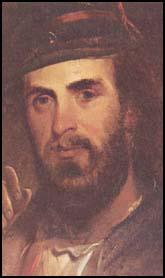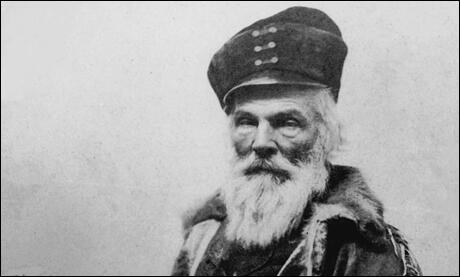Joseph Walker

Joseph Walker was born in Tennessee on 13th December, 1798. He moved to Missouri in 1818 and two years later was involved in taking trade goods to Santa Fe. He was imprisoned by the Spanish authorities in New Mexico but was released to help fight against the Pawnees.
Walker returned home to Missouri and in 1827 he was elected the first sheriff of Jackson County. He served two terms but eventually left because of the low pay. Walker was involved in buying and selling horses until he was recruited by Captain Benjamin Bonneville as field commander of an expedition to the West. Bonneville's party spent two seasons trapping beavers on the Salmon River.
In 1833 Bonneville suggested to Walker that he should take a party of men to California. The beaver appeared to be decline in the Rocky Mountains and it was thought that new trapping opportunities would be found in this unexplored territory.
Walker and his party of forty men left Green River on 20th August, 1833. Each man took four horses. One to ride and three to carry supplies. This included 60 pounds of dried meat per man. When he reached Salt Lake he met with local Bannock Indians to discover the best route west. After these consultations Walker decided to follow the Humboldt River into Nevada. In September, 1833, around 800 Digger Indians surrounded Walker's party. They had never seen guns before and after 39 had been killed they decided to retreat.
Soon afterwards they reached the Sierra Nevada mountains. The climb was difficult and with a shortage of food, several men argued that they should be allowed to go back. Walker insisted that they should continue and after killing and eating some of the horses, they came out of the Sierra after three weeks. Soon afterwards they became the first Americans to explore the Yosemite Valley.
While in California Walker and his men experienced their first earthquake. They also discovered the giant redwood trees. At the end of November the party reached the coast and saw the Pacific for the first time. Walker now headed southward toward Monterey. They were well received by the Spaniards and they spent the next three months building up their strength. Six of the party enjoyed it so much that they got permission from Walker to stay in California.

The Spanish authorities offered Walker a 50 square-mile tract of land if he agreed to stay on and bring in fifty families to settle in Monterey. Walker refused the offer and on 14th February, 1834, Walker's party headed east. At the base of the Sierra he turned south in search of a easier crossing than the one he used on the westward trip. He found it and it was later named the Walker Pass.
Once again the Nevada desert caused the party problems. They ran out of water and a large number of animals died of thirst. To survive the men were forced to drink the blood of these dead animals. In the Humboldt Sink the Diggers once again attacked Walker's party. A battle took place in June and 14 Diggers were killed. The party, without the loss of any men during the journey, arrived at Bear River on 12th July, 1834. One of the members, Zenas Leonard, wrote that the government should take control of California as soon as possible: "for we have good reason to suppose that the territory west of the mountain will some day be equally as important to a nation as that on the east."
In 1835 Walker became brigade leader of the American Fur Company. However, with the decline in the fur trade, Walker became involved in horse and mule trading trips. He also guided wagon trains to California and explored the Mono Lake area.
Joseph Walker died on his Contra Costa County ranch in California on 13th November, 1872.

